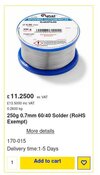Sorry to bring this up as I know it has been discussed but I'm still struggling. I see people have wanted a suitable replacement for the 60/40. However I have tried 3 different sorts and all are no where near as good. I want about a 0.6mm wire of the good old stuff. It just works for me when soldering smd devices. Does anyone sell it and if so who.
At last my 500gm of 24 swg 60/40 multicore is no more.
At last my 500gm of 24 swg 60/40 multicore is no more.

